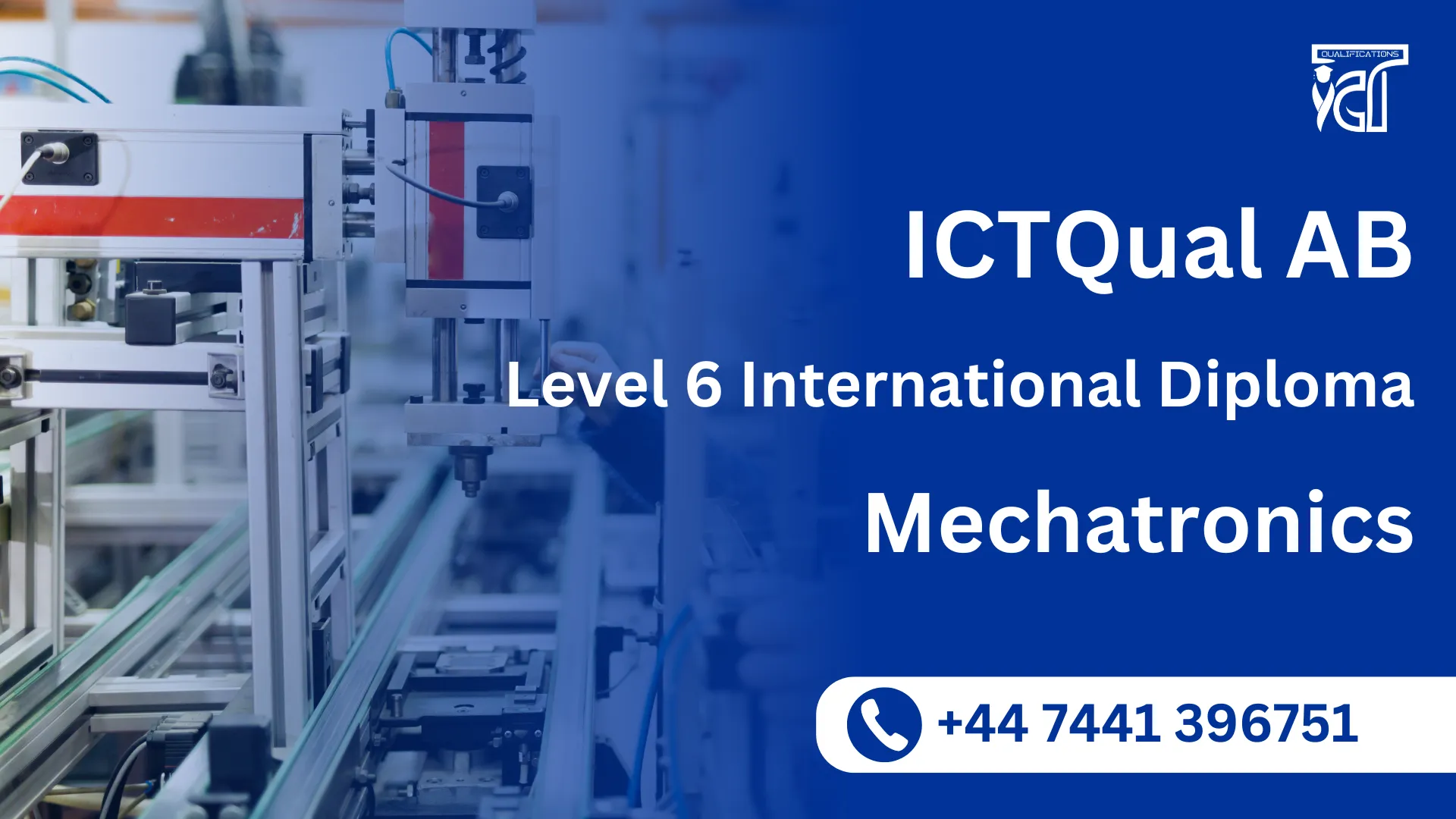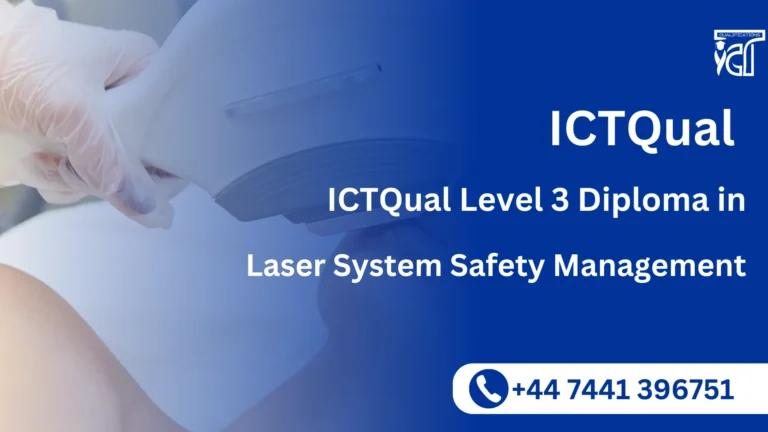The ICTQual AB Level 6 International Diploma in Mechatronics is a comprehensive programme designed to equip learners with advanced knowledge and practical expertise in the integration of mechanical, electronic, and computing systems. Spanning a three-year duration with a 360-credit structure, this diploma is ideal for freshers aspiring to enter the dynamic field of mechatronics, as well as professionals seeking to enhance their technical skills, specialise in automation technologies, and advance their careers in engineering and robotics.
Learners will develop critical competencies in robotics, control systems, automation, electronics, and mechanical design, alongside problem-solving, analytical thinking, and project management skills. The programme emphasises hands-on learning, enabling learners to design, operate, and maintain complex mechatronic systems in industrial, manufacturing, and research environments. By integrating theoretical knowledge with practical applications, learners are prepared to contribute effectively to multidisciplinary engineering teams and innovative projects.
Upon completion, learners can explore diverse career opportunities in industrial automation, robotics engineering, manufacturing, system design, and maintenance. The diploma also provides a solid foundation for those pursuing further specialisation, research, or professional certifications in mechatronics, robotics, or automation engineering.
Key benefits of the programme include a structured learning pathway that enhances technical expertise, exposure to contemporary industry practices, and preparation for leadership and technical roles in engineering sectors. Learners gain professional credibility, practical experience, and the confidence to manage and innovate within complex mechatronic systems.
This programme is tailored for learners committed to excelling in mechatronics, whether entering the workforce or advancing their professional experience, providing the knowledge, skills, and applied insight required to thrive in today’s technologically driven engineering landscape.
ICTQual AB Level 6 International Diploma in Mechatronics
This qualification, the ICTQual AB Level 6 International Diploma in Mechatronics, consists of 36 mandatory units.
Year 1 – Foundation in Mechatronics
- Principles of Mechanical Engineering
- Fundamentals of Electrical and Electronic Engineering
- Engineering Mathematics
- Introduction to Computer Programming
- Materials Science and Engineering
- Engineering Drawing and CAD
- Basics of Control Systems
- Digital Logic and Microprocessors
- Sensors and Instrumentation
- Fundamentals of Robotics
- Health, Safety and Environmental Practices in Engineering
- Communication and Technical Report Writing
Year 2 – Intermediate Studies in Mechatronics
- Advanced Electrical and Electronic Systems
- Applied Thermodynamics and Fluid Mechanics
- Microcontrollers and Embedded Systems
- Automation and PLC Programming
- Mechanical Design and Manufacturing Processes
- Dynamics and Vibration Analysis
- Power Electronics and Drives
- Robotics Systems and Applications
- Mechatronic System Design
- Data Acquisition and Signal Processing
- Industrial Maintenance and Reliability Engineering
- Project Planning and Management in Engineering
Year 3 – Advanced Studies in Mechatronics
- Intelligent Systems and Artificial Intelligence in Engineering
- Advanced Control Engineering
- Robotics and Autonomous Systems
- Smart Manufacturing and Industry 4.0
- Renewable Energy Systems and Applications
- Advanced Computer-Aided Design and Simulation
- Cyber-Physical Systems and IoT in Engineering
- Advanced Mechatronic System Integration
- Engineering Research Methods
- Professional Ethics and Sustainability in Engineering
- Innovation and Entrepreneurship in Technology
- Final Year Major Project (Capstone Project)
Learning Outcomes for the ICTQual AB Level 6 International Diploma in Mechatronics:
Year 1 – Foundation in Mechatronics
Principles of Mechanical Engineering
- Understand the fundamental laws of mechanics, motion, and energy.
- Apply mechanical principles to solve engineering problems.
- Demonstrate knowledge of simple machines, force systems, and structural behaviour.
Fundamentals of Electrical and Electronic Engineering
- Explain electrical principles including current, voltage, resistance, and power.
- Analyse basic electronic circuits and their applications.
- Use measurement tools to evaluate electrical systems.
Engineering Mathematics
- Apply algebra, calculus, and trigonometry to engineering problems.
- Use mathematical models to interpret technical systems.
- Develop problem-solving skills through applied numerical methods.
Introduction to Computer Programming
- Understand programming logic and flow control.
- Develop simple programs using a high-level language (e.g., C/C++ or Python).
- Apply programming to solve basic engineering-related tasks.
Materials Science and Engineering
- Identify different classes of engineering materials and their properties.
- Understand the relationship between structure and performance.
- Select appropriate materials for specific engineering applications.
Engineering Drawing and CAD
- Interpret engineering drawings using international standards.
- Use CAD software to create 2D and 3D models.
- Apply geometric tolerancing and dimensioning principles.
Basics of Control Systems
- Understand open-loop and closed-loop control systems.
- Analyse system behaviour using transfer functions and block diagrams.
- Demonstrate knowledge of basic controllers such as PID.
Digital Logic and Microprocessors
- Understand binary systems, logic gates, and combinational circuits.
- Analyse and design simple digital circuits.
- Explain the role of microprocessors in embedded systems.
Sensors and Instrumentation
- Identify different types of sensors and transducers.
- Understand principles of measurement and signal conditioning.
- Apply instrumentation to monitor engineering processes.
Fundamentals of Robotics
- Explain basic concepts of robotic systems and automation.
- Identify different types of robots and their industrial uses.
- Understand coordinate systems and kinematics in robotics.
Health, Safety and Environmental Practices in Engineering
- Apply workplace safety regulations and risk assessments.
- Identify hazards and implement control measures.
- Understand environmental sustainability in engineering practices.
Communication and Technical Report Writing
- Develop clear written and verbal technical communication skills.
- Structure and present engineering reports effectively.
- Use professional referencing and technical documentation standards.
Year 2 – Intermediate Studies in Mechatronics
Advanced Electrical and Electronic Systems
- Analyse AC/DC circuits and power distribution systems.
- Understand advanced semiconductor devices and applications.
- Apply circuit simulation and testing techniques.
Applied Thermodynamics and Fluid Mechanics
- Apply thermodynamic laws to engineering systems.
- Analyse energy transfer in engines, compressors, and turbines.
- Understand fluid dynamics and fluid machinery.
Microcontrollers and Embedded Systems
- Develop embedded systems applications using microcontrollers.
- Interface sensors and actuators with microcontrollers.
- Use assembly and high-level programming for embedded applications.
Automation and PLC Programming
- Understand automation principles in industrial environments.
- Program and troubleshoot PLC-based systems.
- Apply ladder logic and advanced programming functions.
Mechanical Design and Manufacturing Processes
- Apply design principles for mechanical components.
- Understand manufacturing processes including machining, casting, and additive manufacturing.
- Evaluate cost, efficiency, and sustainability in design.
Dynamics and Vibration Analysis
- Analyse motion in dynamic systems.
- Understand vibration theory and its effects on mechanical systems.
- Apply damping and vibration isolation techniques.
Power Electronics and Drives
- Explain the operation of power semiconductor devices.
- Analyse rectifiers, inverters, and converters.
- Understand the control of electrical drives and motors.
Robotics Systems and Applications
- Apply kinematics and dynamics to robotic systems.
- Understand path planning and control strategies.
- Evaluate robotics in industrial automation.
Mechatronic System Design
- Integrate mechanical, electrical, and software components in system design.
- Apply system modelling and simulation tools.
- Develop prototype designs for real-world applications.
Data Acquisition and Signal Processing
- Understand principles of data acquisition systems.
- Apply sampling, filtering, and signal analysis methods.
- Use software tools for processing engineering signals.
Industrial Maintenance and Reliability Engineering
- Apply preventive and predictive maintenance strategies.
- Analyse failure modes and reliability engineering principles.
- Implement condition monitoring techniques.
Project Planning and Management in Engineering
- Understand project management methodologies (e.g., PMBOK, PRINCE2 basics).
- Apply planning tools such as Gantt charts and critical path analysis.
- Manage budgets, resources, and risk in engineering projects.
Year 3 – Advanced Studies in Mechatronics
Intelligent Systems and Artificial Intelligence in Engineering
- Understand AI applications in mechatronics.
- Apply machine learning algorithms for engineering solutions.
- Evaluate expert systems and decision-making models.
Advanced Control Engineering
- Analyse advanced control strategies including state-space models.
- Apply digital and adaptive control systems.
- Design controllers for complex dynamic systems.
Robotics and Autonomous Systems
- Understand autonomy and navigation in robotic systems.
- Apply machine vision and sensor fusion.
- Develop algorithms for autonomous robotic control.
Smart Manufacturing and Industry 4.0
- Understand cyber-physical systems in smart factories.
- Apply IoT and automation in digital manufacturing.
- Analyse challenges and opportunities in Industry 4.0.
Renewable Energy Systems and Applications
- Evaluate renewable energy technologies such as solar, wind, and fuel cells.
- Analyse energy storage and distribution systems.
- Apply renewable energy integration into engineering systems.
Advanced Computer-Aided Design and Simulation
- Develop 3D models and simulate engineering systems.
- Apply finite element analysis (FEA) and computational fluid dynamics (CFD).
- Evaluate design performance through simulation results.
Cyber-Physical Systems and IoT in Engineering
- Understand the integration of hardware, software, and networks.
- Apply IoT protocols in engineering applications.
- Design cyber-physical systems for industrial use.
Advanced Mechatronic System Integration
- Integrate advanced components into a complete system.
- Apply system validation and verification techniques.
- Solve real-world engineering challenges through system integration.
Engineering Research Methods
- Develop research proposals in engineering contexts.
- Apply qualitative and quantitative research techniques.
- Interpret data and present findings in an academic format.
Professional Ethics and Sustainability in Engineering
- Understand ethical responsibilities of engineers.
- Apply sustainability frameworks in engineering design.
- Analyse the social and environmental impact of engineering solutions.
Innovation and Entrepreneurship in Technology
- Understand principles of innovation and technology transfer.
- Develop entrepreneurial skills for engineering ventures.
- Create business models for engineering solutions.
Final Year Major Project (Capstone Project)
- Undertake independent research or applied engineering project.
- Demonstrate integration of multidisciplinary knowledge.
- Present findings through a professional report and presentation.
The ICTQual AB Level 6 International Diploma in Mechatronics offers a comprehensive and industry-driven learning experience designed for learners aiming to excel in advanced engineering and technology sectors. Whether you are a fresh learner looking to enter the field or a professional seeking career advancement, this diploma provides the perfect balance of theoretical knowledge and hands-on application. Learners gain globally recognised skills in mechanical systems, electronics, robotics, and automation—making them highly competitive in diverse engineering environments and international job markets.
1. Advanced Technical Knowledge
- In-depth understanding of mechatronic systems, robotics, and automation.
- Covers mechanical engineering, electronics, control systems, and programming.
- Aligns with the latest global engineering and manufacturing standards.
- Equips learners with skills applicable to multi-disciplinary engineering roles.
- Encourages critical thinking and innovative problem-solving.
2. Industry-Relevant Practical Skills
- Hands-on projects and simulations reflecting real-world industrial challenges.
- Exposure to cutting-edge tools, software, and modern engineering techniques.
- Prepares learners for roles in robotics, manufacturing, and automation sectors.
- Enhances troubleshooting and maintenance expertise for complex systems.
- Builds confidence in applying knowledge to practical engineering scenarios.
3. Global Recognition and Career Opportunities
- Accredited by ICTQual AB, ensuring international credibility.
- Opens doors to career opportunities worldwide in engineering and technology.
- Suitable for learners aiming for senior technical or managerial positions.
- Supports career shifts into high-demand mechatronic and automation industries.
- Recognised by employers seeking advanced technical proficiency.
4. Pathway to Higher Education and Certifications
- Serves as a stepping stone to Level 7 postgraduate qualifications.
- Meets prerequisites for professional certifications in engineering disciplines.
- Offers opportunities for further specialisation in robotics, AI, or industrial automation.
- Supports progression into research or academic roles.
- Strengthens learners’ portfolios for advanced university admissions.
5. Personal and Professional Development
- Builds leadership, teamwork, and communication skills for engineering contexts.
- Encourages innovative thinking and adaptive learning in fast-evolving industries.
- Develops project management and organisational skills.
- Increases confidence to handle multidisciplinary engineering challenges.
- Enhances employability and long-term career growth prospects.
The ICTQual AB Level 6 International Diploma in Mechatronics is tailored for motivated learners who are passionate about integrating mechanical engineering, electronics, and automation to solve complex industrial challenges. It is equally suitable for fresh learners aiming to build a strong foundation in mechatronics and for experienced professionals seeking to enhance their expertise and career prospects in advanced technology sectors.
1. Fresh Engineering Enthusiasts
- Learners recently completing secondary education or equivalent.
- Passionate about robotics, automation, and modern engineering systems.
- Eager to develop practical and theoretical knowledge in a high-demand field.
- Looking to establish a strong technical foundation for further studies or employment.
- Interested in exploring diverse career opportunities in technology and manufacturing.
2. Mid-Career Engineering Professionals
- Individuals already working in mechanical, electrical, or manufacturing industries.
- Seeking to upgrade their skills and gain globally recognised qualifications.
- Aiming for supervisory, specialist, or managerial positions in engineering.
- Interested in bridging knowledge gaps in multi-disciplinary mechatronic systems.
- Looking to stay competitive in rapidly evolving technology sectors.
3. Aspiring Innovators and Technologists
- Learners motivated by innovation, product development, and creative problem-solving.
- Interested in designing, building, or improving automated systems.
- Passionate about contributing to robotics, AI integration, and smart manufacturing.
- Keen to apply new technologies to address industrial challenges.
- Eager to participate in projects that push the boundaries of engineering solutions.
4. Entrepreneurs and Start-up Visionaries
- Individuals planning to launch or grow businesses in robotics, automation, or manufacturing.
- Looking to gain comprehensive knowledge to make informed business decisions.
- Eager to understand technical aspects to complement business strategies.
- Interested in networking opportunities within the global engineering community.
- Seeking to enhance credibility with partners and investors through a recognised qualification.
5. Learners Seeking International Opportunities
- Professionals aiming to work in multinational corporations or overseas industries.
- Interested in a qualification recognised globally for its quality and relevance.
- Looking to enhance employability in high-demand mechatronics markets.
- Keen on pursuing further studies abroad or collaborating in global projects.
- Motivated to stand out in competitive international job markets.
Completing the ICTQual AB Level 6 International Diploma in Mechatronics opens multiple pathways for learners to advance their education, career, and professional development. This qualification equips learners with advanced technical expertise and a globally recognised credential, ensuring they can confidently progress into senior roles, further studies, or entrepreneurial ventures within the fast-evolving engineering and technology sectors.
1. Progression to Higher Education
- Eligible to pursue Level 7 Postgraduate Diplomas or Master’s degrees in Mechatronics, Robotics, or Automation.
- Provides a strong foundation for advanced engineering specialisations.
- Meets entry requirements for professional engineering certifications.
- Supports transition into academic or research-based programmes.
- Strengthens applications for top universities worldwide.
2. Career Advancement in Engineering and Technology
- Opens opportunities for senior roles such as Mechatronics Engineer, Automation Specialist, or Robotics Engineer.
- Prepares learners for leadership positions in manufacturing, automotive, or aerospace industries.
- Enhances potential for promotions or lateral moves within current organisations.
- Increases competitiveness for international job placements.
- Recognised by employers as evidence of advanced multidisciplinary expertise.
3. Specialisation in Emerging Technologies
- Pathway to focus on areas such as Artificial Intelligence integration, Smart Manufacturing, or Industrial IoT.
- Opportunities to contribute to cutting-edge automation and robotics projects.
- Encourages participation in innovation and research-driven initiatives.
- Prepares learners for roles in high-tech and R&D sectors.
- Enables adaptation to evolving technological advancements.
4. Entrepreneurship and Business Development
- Equips learners with the technical knowledge to start robotics or automation-based businesses.
- Enhances strategic planning and decision-making for technology-driven enterprises.
- Builds confidence to develop innovative products or services for global markets.
- Provides networking opportunities within the engineering and industrial community.
- Strengthens credibility with clients, partners, and investors.
5. Professional Certifications and Global Opportunities
- Supports eligibility for recognised engineering bodies and professional memberships.
- Prepares learners for certifications in robotics, PLC programming, or automation systems.
- Facilitates international mobility within the engineering and technology workforce.
- Opens doors to collaborative global projects or consultancy roles.
- Positions learners as competitive candidates in high-demand global industries.
As an approved centre of ICTQual AB, we offer two flexible certification routes to suit the background and experience of every learner. By enrolling with us, you ensure access to recognised training, expert guidance, and a globally respected qualification in Mechatronics.
Route 1: Experienced Professionals
- Designed for learners with at least six years of verifiable industry experience in engineering, robotics, automation, or related fields.
- Recognises prior knowledge and expertise, allowing for a fast-track completion of the diploma.
- Ideal for professionals seeking to validate their skills with an internationally recognised credential.
- Focuses on advanced modules, applied projects, and leadership-level competencies.
- Perfect for career progression into senior engineering or managerial roles.
Route 2: Fresh Learners
- Tailored for learners new to mechatronics or early in their careers.
- Requires the completion of 36 structured assignments to build strong theoretical and practical foundations.
- Offers comprehensive support, mentorship, and resources for developing essential skills.
- Provides step-by-step learning for a smooth entry into the engineering and automation industry.
- Prepares fresh learners for exciting career opportunities or further higher-level studies.
Entry Requirements
To ensure learners are fully prepared for the academic and practical demands of this advanced qualification, the following entry requirements must be met:
Minimum Age
- Learners must be 18 years or older at the time of enrolment.
- This ensures maturity and readiness for Level 6 study and professional development.
Educational Background
- A Level 5 Diploma, Higher National Diploma (HND), or equivalent qualification in engineering, electronics, robotics, or a related field.
- Alternatively, applicants with strong secondary education and relevant technical training may be considered.
- Academic records must demonstrate sufficient knowledge in mathematics, physics, or engineering fundamentals.
Experience
- Route 1 (Experienced Professionals): At least six years of verifiable industry experience in mechatronics, robotics, automation, or related disciplines.
- Route 2 (Fresh Learners): No prior industry experience required; completion of 36 assignments under guided instruction is mandatory.
Language Proficiency
- Proficiency in English is essential for understanding course materials and assessments.
- Non-native English speakers should demonstrate competence through recognised tests (e.g., IELTS 5.5 or equivalent) or provide evidence of prior education conducted in English.
Register Now
Qualification Process
Qualification Process for the ICTQual AB Level 6 International Diploma in Mechatronics
- Self-Assessment:
Begin by evaluating your eligibility to ensure you meet the qualification requirements, including work experience, knowledge, and language proficiency. - Registration:
Complete your registration by submitting the required documents, including a scanned copy of a valid ID, and paying the registration fee. - Induction:
An assessor will conduct an induction to confirm your eligibility for the course and explain the evidence requirements. If you do not meet the criteria, your registration will be cancelled, and the fee will be refunded. - Assignments & Evidence Submission:
Provide all assignments and the necessary evidence based on the assessment criteria outlined in the course. If you are unsure of the required evidence, consult with the assessor for guidance on the type and nature of evidence needed. - Feedback and Revision:
The assessor will review your submitted evidence and provide feedback. Evidence that meets the criteria will be marked as “Criteria Met,” while any gaps will be identified. You will be asked to revise and resubmit if needed. - Competence Evidence:
Submit final evidence demonstrating that all learning outcomes have been met. This evidence will be marked as “Criteria Met” by the assessor once it is satisfactory. - Internal Quality Assurance (IQA):
The Internal Quality Assurance Verifier (IQA) will review your evidence to ensure consistency, quality, and compliance with standards. - External Verification:
The IQA will submit your portfolio to ICTQUAL AB External Quality Assurance Verifiers (EQA) for final confirmation. The EQA may contact you directly to verify the authenticity of your evidence. - Certification:
Upon successful completion of all checks, ICTQUAL AB will issue your official certificate, confirming that you have attained the ICTQual AB Level 6 International Diploma in Mechatronics.







